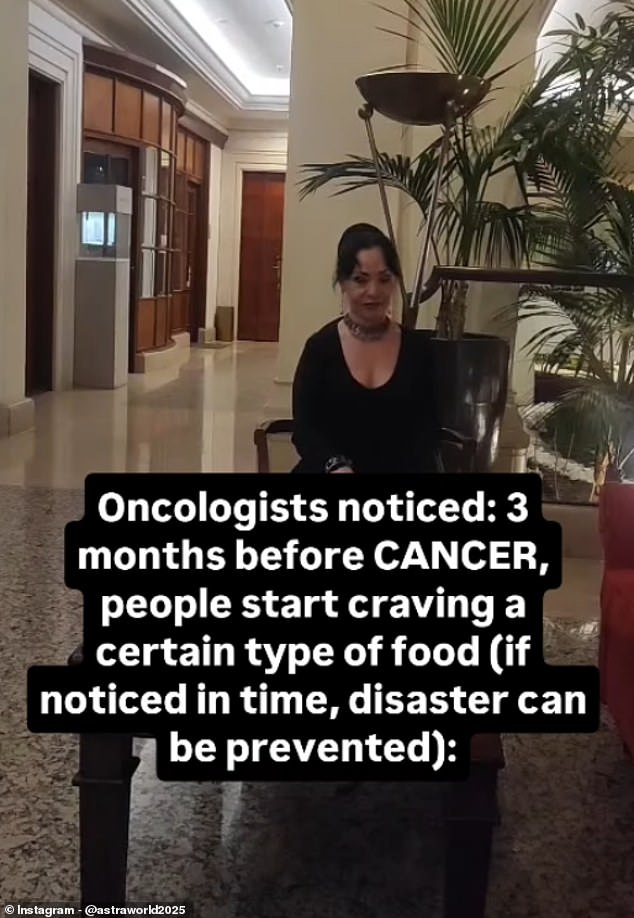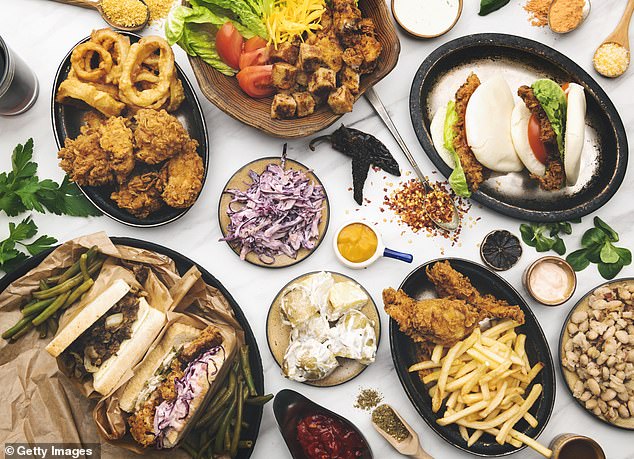Bizarre cravings for the likes of chocolate, pizzas and even whole lemons, are often considered unique to pregnancy.
But a similar phenomenon may be a premonition of some cancers, doctors have reported.
Research has also suggested food cravings may be associated with certain cancers including breast, ovarian and endometrial.
Yet, just as cravings and aversions in pregnancy tend to vanish after the baby is born, so do these cancer induced taste distortions following treatment.
In an Instagram video watched almost two million times, one influencer said: ‘Many doctors are convinced: the body sends SIGNALS long before any diagnosis.
‘One of the most unexpected is a sudden and almost obsessive craving for a certain type of food.
Two to three months before a person is diagnosed with cancer, they may literally get “hooked” on a product they never cared about before.
‘It’s not just “I want to treat myself,” but as if the body is shouting: “Give me this right now.”’

In an Instagram video watched almost two million times, one influencer said: ‘Many doctors are convinced: the body sends SIGNALS long before any diagnosis’
Your browser does not support iframes.
They added: ‘In one interview, a doctor said: “In patients with gastrointestinal tumors, a few months before the diagnosis, a strong craving for sweets appears.
‘”People eat ice cream by the kilo, even though they never cared for desserts before.”
‘The explanation is clear: tumor cells consume glucose faster than healthy ones, so the brain starts programming behavior to serve the disease.’
The influencer also revealed a woman who was later diagnosed with kidney cancer, had claimed she could drink ‘pickle brine straight from the jar and eat it with crackers’.
Another suddenly got ‘hooked’ on dairy products. Relatives thought it was just ‘a phase’ or ‘new tastes’.
‘In reality, the body sends messages in advance—most just delete them without even opening,’ they added.
Limited research has also suggested that changes in food behaviour could be a pre-cursor to cancer diagnoses.
In one 2022 review, analysing seven studies on the topic, Italian researchers noted that ‘food cravings have been found to be associated with breast cancer, lymphoma, and ovarian or endometrial cancer’.
Your browser does not support iframes.
Your browser does not support iframes.
Writing in the International Journal of Environmental Research and Public Health, the researchers said: patients had higher cravings overall and for specific food subscales such as fast foods, sweets, carbohydrates—starchy food—and fats.
‘We strongly recommend food behavior screening for cancer patients, both at the initial visit and during the follow-up period, in order to promptly detect any potential alteration in food behavior.’
However, they noted that given the limited research on the top, there is ‘still a significant knowledge gap’.
‘A better understanding of food behavior among cancer patients and survivors is of paramount importance to provide appropriate and multi-professional healthcare support,’ they added.
Over 40 years ago, Dr Thurstan Brewin of the Glasgow Institute of Oncology reported that one in four of his patients described how months before being diagnosed, they had seemingly inexplicably lost their appetite for a previously favoured food or drink.
For one, tea became ‘most unpleasant’, another said cheese tasted ‘like chewing gum’, while a third reported that sausages became ‘leathery’.
But such cravings would disappear once treated for their cancer.
Writing in the journal Clinical Radiology, he said: ‘Spontaneous return to normal is quite common in cases triggered by tumour treatment, but rare in cases starting before diagnosis.

Over 40 years ago, Dr Thurstan Brewin of the Glasgow Institute of Oncology reported that one in four of his patients described how months before being diagnosed, they had seemingly inexplicably lost their appetite for a previously favoured food or drink
Your browser does not support iframes.
Your browser does not support iframes.
‘The latter may cease when the tumour is treated.
The explanation for these highly selective and rapidly reversible aversions or cravings is totally obscure.’
In an interview with the American Medical Association, Dr Amar Kelkar, a stem cell transplanation physician at the the Dana-Farber Cancer Institute in Boston, said the sudden desire to eat ice, dirt, or other unconventional edible—or inedible—object may be the body reacting urgently to a deficiency.
‘Basically, you’re having some urgency to replace an iron craving. But we don’t have any way to manifest that,’ he said.
A blood test will determine if patients are anemic, triggering further tests to determine the cause—one of which could be colon or colorectal cancer.
Other experts, however, have noted that further research is first vital and the notion, for example, that sugar should be avoided to prevent cancer growth is unfounded.
There is no evidence to show that craving sugar is a symptom of cancer.
The alleged relationship between cancer and sugar is a long and complicated one.
